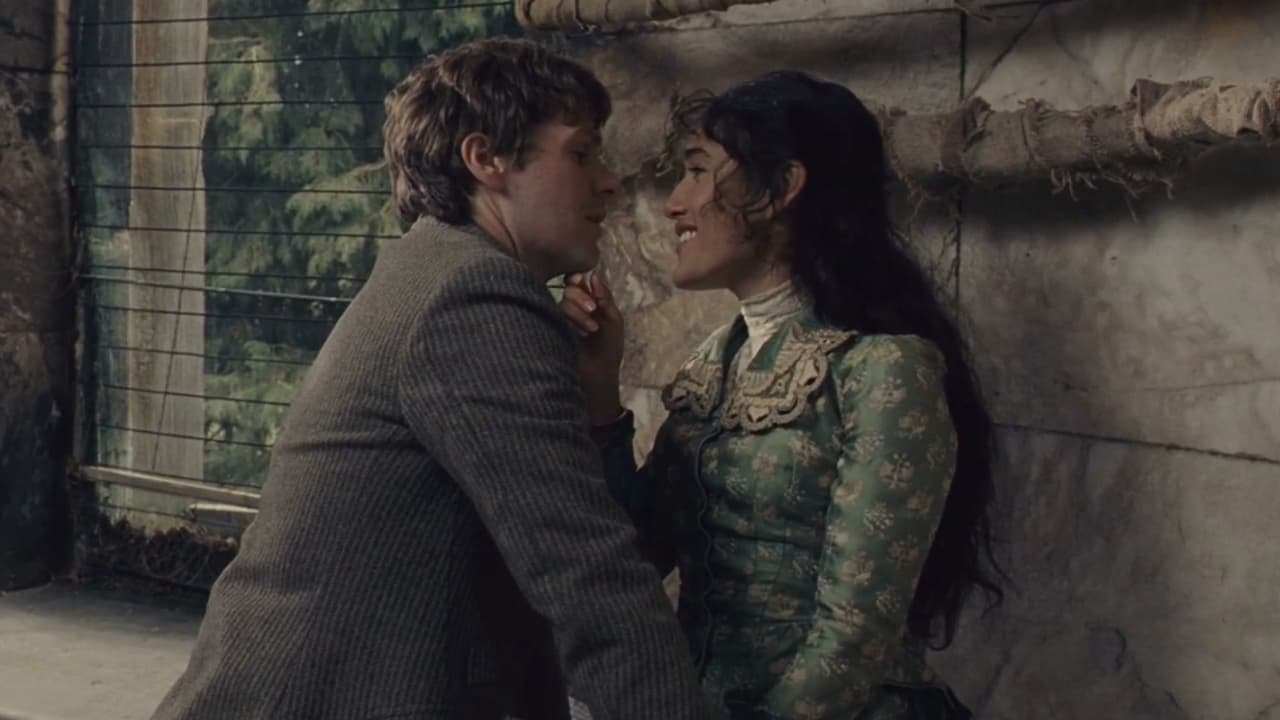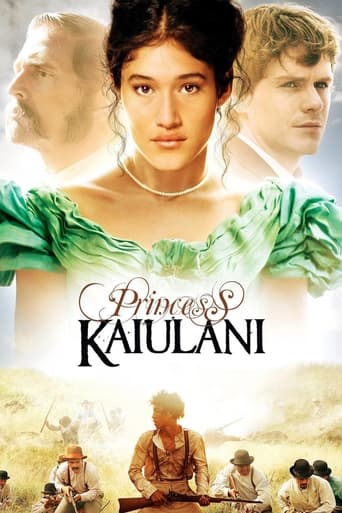

Wonderfully offbeat film!
... View MoreGood , But It Is Overrated By Some
... View MoreThis is a small, humorous movie in some ways, but it has a huge heart. What a nice experience.
... View MoreThe best films of this genre always show a path and provide a takeaway for being a better person.
... View MoreI went in this movie looking forward to see Q'Orianka Kilcher's performance after having the pleasure of watching her acting in The New World (2005). Unfortunately for me, this movie failed to live up to my expectations. Before I talk about the negative aspects of this movie, I should talk about the few good things: the cinematography and costumes are breathtakingly beautiful, but they can't make up for the blandly delivered dialogue, the emotionless, awkward romance, and some atrocious pieces of acting. Now, the actors themselves have proved they can act in other movies; thus I find fault with the director and the script. I wasn't connected at all to the love story and I found myself not believing anything they said or felt for each other. Except for some sensual kissing scenes, the romance was poorly done. Aside from that, the movie is full of historical inaccuracies, although I've come to expect that when watching a period drama film. My verdict is to skip this movie and go read or watch a documentary if you want to know more about the real Princess Kaiulani.
... View MoreKa'iulani did exist – at least they got that right. She was an interesting minor historical figure, beautiful, charming, smart, brave and determined. They got that right too, but not much else. Some of the main facts were correct. She was the last heir to the throne of Hawai'i, educated in England and did visit President Cleveland. Her family's monarchy was suppressed and her country annexed by the USA. But history isn't so clear about her motivations – to nobly serve her people, as in the movie, or to retain/regain her family's enjoyment of hereditary power and adulation.The real Ka'iulani was something of a heroic failure. Her charisma and shuttle-diplomacy may have delayed some of the inevitable, but not by much and she achieved almost nothing in the end. She had long suffered from ill-health (ignored in the movie) and died in her early 20s. A true biopic of her life would be fascinating but rather sad and depressing. This manufactured twaddle was nothing much at all.Kilcher is a fine actress, as shown in New World (where she had rather better support) and she does her best here in a feebly written part. The support is horrible, Pepper hamming it up as the villain and Evans as a shoehorned-in love-interest bland and tedious enough to stretch credibility as any kind of interest for a woman like this. The script is trite and ghastly, apart from authentic quotes – Princess K herself had better script-writers! Production values, costumes and settings do pull this up a little way by the bootstraps but not very far.The worst thing here is the manufactured story, not only false but lacking any originality. The romantic strand is trite, ridiculous and way too time-consuming – as though there was nothing more interesting to say about this woman. Ludicrous cameos – nasty people from her schooldays being welcomed and helped by this saintly figure. And a true Hollywood-style happy ending. Meanwhile the true hero of the vain battle to preserve Hawai'i from the USA, Queen Liliʻuokalani, is diminished to an insignificant bit-player. This movie may have been well-intentioned but it's worse than just a waste of time. To turn the history of these real and genuinely fascinating women into this clichéed garbage is criminal.
... View MoreThe other reviews were clearly written by the writer/director or friends of the writer/director or cast members. Don't be fooled. They're more like gushing summaries than real reader reviews. There's much more interesting characters to be portrayed than this person. Wow.... This movie was boring boring boring and amateurish at times. Who funded this thing and how is it possible? I have a couple of bridges I'd like to sell to the financier. This movie doesn't even belong on Lifetime. If you're looking for a good night's rest, I would suggest Ambien. If you're looking to waste 15 minutes of your life before falling asleep, try beating your head against the wall to knock yourself out. You'll still feel better about that 15 minutes than having spent it watching any of this film. This must be a first for the writer/director. Hopefully the last as well.
... View MoreBurt Lancaster was not an Indian, but the English/Irish actor played a Potawatomi in Max Steiner's "Jim Thorpe: All-American" and one of Geronimo's tribesman in Robert Aldrich's "Apache". Paul Muni had no Chinese blood. Susan Kohner had no black blood. Marlon Brando had no Okinawan blood. In retrospect, now that the cinema is well-represented by all walks of life, such racial performances, however well-meaning, instantly dates the film. Blood is important, but it doesn't necessarily have to make or break the movie if the filmmaker employs red-face(or black-face, or yellow-face) simply as a means to an end(the productions of "The Good Earth", "Imitation of Life", and "The Teahouse of the August Moon" would not have been mad without the prevailing film industry's political incorrect casting practices), in which the masquerading actors aren't consciously foregrounding their appropriated ethnic impersonation through grotesque minstrelism(for starters, Mickey Rooney's take on the Japanese in Blake Edwards' "Breakfast at Tiffany's"). Nowadays, if a minority race gets misrepresented, it's less a matter of outright racism, but rather, a marketability concern, which is best exemplified by the casting of non-Japanese actresses Zhang Ziyi, Gong Li, and Michelle Yeoh in "Memoirs of a Geisha". Likewise, "Princess Kaiulani", a sugar-coated chronicling of the Hawaiian royal who, due to American intervention, was denied the chance to rule her island nation, would never have been financed with a "Hapa"(a Hawaiian with Caucasian blood). It's a knee-jerk reaction to call this film racist, because the overriding flaw of "Princess Kaiulani" has nothing to do with Q'orianka Kilcher's Peruvian/Spanish background; it's the performance that the filmmaker coaxes out of her, which doesn't clearly delineate a resolute anti-colonization stance. That's because the star of Terrence Malick's "The New World", as Kaiulani, behaves more like her oppressors, than the native Hawaiians she professes to love.By all accounts, Princess Kaiulani was not a coward, so the historical inaccuracy of a colonialist-led insurgency(during a lighting ceremony which introduced electricity to Honolulu) as being the catalyst for her overseas voyage to England, could be construed as an insult to the girl's legacy. Being non-Hawaiian is not the insult. But it's a forgivable offense(in the context of narrative film), since all biopics that depict the past rewrites itself for the sake of clarity and time compression. While in London, Kaiulani complies with Belle Epoque fashion(wide-shouldered blouse with muttonchop sleeves, cinched with a corset and wide belt to hug the waist), which wouldn't have been especially foreign to the princess, who wore European-style clothing back home, but Kilcher's assignation of the fairer "ali'i" suggests that the filmmaker decided against addressing the young woman's "other-ness". Although Kaiulani should look English, she shouldn't literally be a descendant of Queen Victoria, which is how Kilcher plays the princess, as a "barbarian" without the slightest trepidation about gaining entree into a wholly new culture. Kaiulani seems bereft of royal carriage, giggling and mugging for Clive(Shaun Evans), lost as she is in the throes of love, despite her consciousness(that's why the opening scene proves to be problematic) of the governmental tumult back home, having been a first-hand witness to the king's premier being taken hostage at gunpoint by the Hawaiian League before her hasty departure. This big romance dominates "Princess Kaiulani", at the expense of detail surrounding the fallout from the Bayonet Constitution that resulted in the reigning queen(Liliokulani) being ousted from her dismantled court. The film conjures up emotional uplift(big rabble-rousing speeches, an appointment with President Cleveland, the restoration of her title, purely symbolic) to obscure the tragedy that befell the native population, who had lost their land to the missionaries(a fact that gets lost in Kaiulani's small victory of restoring the Hawaiian people's right to vote), and lives(due to disease transmitted from the newly minted foreign landowners). Not enough is made ado about this drastic transference of power. Worst of all, despite Clive being in cahoots with his family to deceive Kaiulani(who should have known that a coup was in the making), she accepts the British gentleman with open arms at her seaside "coronation", going so far as kissing him in front of her people during their darkest hours. That is not how a dethroned monarch would act. "Princess Kaiulani" treats the loss of her personal happiness and kingdom as commiserating catastrophes. Being ethnic for an ethnic role, in this case, Hawaiian, is not nearly as important as acting certifiably ethnic, a non-Hawaiian with an authentic spirit, which is what Kilcher lacks, as a result of he filmmaker's passive attitude towards colonization.
... View More